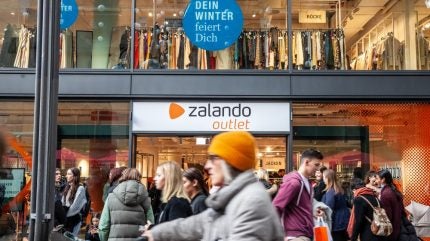
Zalando has reported its revenue dropped to €10.14bn ($11.09bn) in the year ending 31 December 2023 (FY23) from €10.34bn the year before.
The retailer has also announced its evolving strategy to shift from a platform model to an ecosystem one in a bid to grow in both the Business-to-Consumer (B2C) and Business-to-Business (B2B) sectors.
The retailer said it met its revised guidance for Gross Merchandise Volume (GMV) and revenue in FY23, and achieved the top end of its adjusted EBIT range in what was a “challenging year for online fashion retail”.
FY23 results in-brief
- Revenue decreased 1.9% from €10.34bn to €10.14bn.
- GMV fell 1.1% from €14.79bn to €14.63bn.
- EBIT increased more than 100% from €81m to €190.9m.
Zalando’s CFO Sandra Dembeck noted the retailer is making improvements and is using its “healthy balance sheet” to invest in its “strategic priorities” of an “ecosystem vision”.
This includes the quality of the customer experience, new fashion and lifestyle propositions, technology to increase customer engagement and expanding its B2B offering.
Dembeck added: “We have the financial strength to successfully build the ecosystem for fashion and lifestyle ecommerce.”
GlobalData’s retail analyst Chloe Collins believes Zalando fell victim to the “slowdown” of the online fashion pureplay market in 2023.
She suggested the retailer’s fashion store sales drop of 4.5% was to blame for the decline with “consistent failures” across both the DACH region (Germany, Austria, and Switzerland) and the rest of Europe.
She added that its Offprice revenue grew 10.8% as shoppers continued to look for more affordable options during economic turbulence
Collins added the retailer’s superior capabilities have allowed its Partner Program, which enables brands to have greater control of their presence on Zalando’s platform, to thrive.
She said: “Commission earned contributed significantly to its improvement in EBIT, and it has plans to scale the offer further in FY2024, prompting it to split its business into Business-to-Consumer (B2C) and Business-to-Business (B2B).”
Zalando’s strategic expansion plans with B2B, B2C
Zalando believes its new ecosystem model will be a strategic evolution from its current platform and will allow it to cover a larger share of the fashion and lifestyle ecommerce market as well as deepen relationships with customers and partners in both B2B and B2C.
In the B2C sector, Zalando aims to stand out by prioritising quality, enhancing existing categories like Sports and Kids & Family, and offering personalised inspiration and entertainment for shoppers.
The retailer is also expanding its reach in B2B by leveraging its logistics infrastructure, software, and service capabilities to become a “crucial facilitator” for ecommerce transactions, irrespective of whether they occur on or off Zalando’s platform.
In the mid-term, Zalando expects the B2B growth vector to develop into a multi-billion-euro business. The retailer highlighted that its updated strategy sets out the path for growth in the medium term and will support new financial targets through 2028.
With both B2C and B2B, Zalando said it aims to cover in the long term the equivalent of 15% of the European fashion market, which is worth €450bn.
Developing strong brand relations with customers and partners
Collins noted that the growth of Zalando’s B2B services will enable it to develop strong brand relationships and ensure its ranges remain competitive compared with other multi-branded platforms like Asos and About You.
She added that the company’s AI developments, including its new fashion assistant and enhanced size advice, will help it stay ahead of the pack and create a seamless shopping experience.
Collins shared that Zalando has already onboarded “exciting sports brands” such as Lululemon, Hoka and Rapha in 2023, followed by disrupter On in February 2024, which she said will increase the “desirability” of its offer.
She added: “Zalando also plans to elevate its Sports category in FY2024, which may seem risky given the slowdown experienced by many specialists such as Nike and Puma in 2023. However, the sportswear market is expected to outperform again from 2024, as consumers continue to invest in their health and fitness and prioritise comfortable, versatile apparel.”
Kids & Family is another product focus for the company, but Collins warned this may take “longer to bear fruit,” as family shoppers have typically been the worst hit by inflationary challenges.
Zalando was keen to point out its ecosystem approach will enable partners to work towards their sustainability ambitions and help them understand the rapidly evolving regulatory environment.
Zalando’s ambition is to achieve net-zero CO2 emissions for its own operations and private label business by 2040, and across the entire business by 2050.



